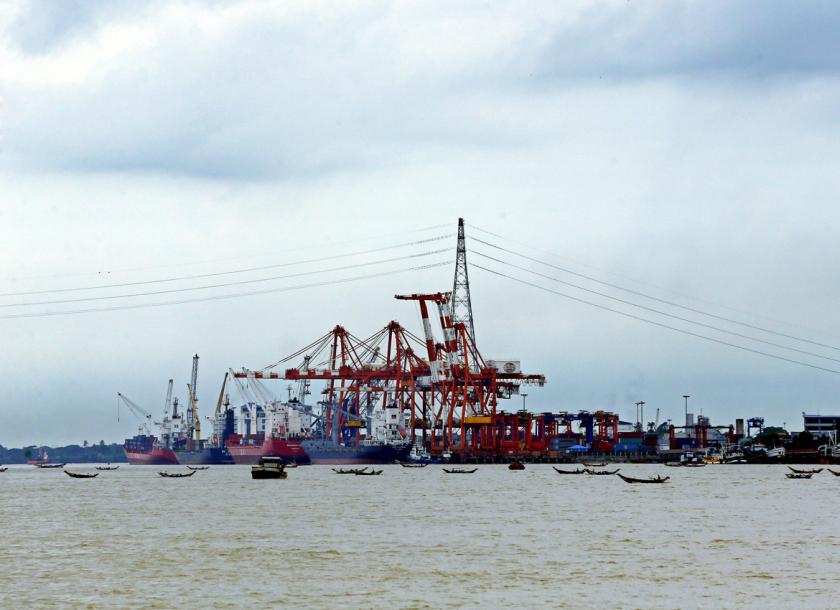New strategy needed to heal “sick” Myanmar economy
A new strategy encompassing the customs and values of the Myanmar people, including members of the Tatmadaw, residents, civilians and nationals residing abroad, is necessary to treat a “sick” Myanmar economy,” said Dr. Myint, who was Chief Economic Advisor of former President U Thein Sein, during the Union of Myanmar Federation of Chambers of Commerce and Industry Convention 2017 in Yangon on December 9.
“There is a perception that our economy is not functioning well because we are not giving it the attention it deserves,” Dr Myint said.
Even though GDP per capita has improved substantially, rising from $193.2 in 2000 to $1,194.6 in 2015, Myanmar is still among the lowest ranked countries in ASEAN, ahead of just Cambodia in terms of average income generated by its residents.
Furthermore, chances of catching up with GDP per capita in Laos, which is one rank higher than Myanmar, within the next few years, are slim. “This is a crucial issue facing us today. I think there is general agreement that the economy is not in good shape. There is growing concern that the situation may get worse,” said Dr Myint.
As such, to achieve the International Monetary Fund’s projected GDP per capita target of $1,832 by the 2020-21 fiscal year, a new strategy to promote economic development is necessary. “We will need a strategy to promote economic growth,” he said.
That strategy, based on Dr Myint’s Myanmar Eco Vision (MEV), was presented during the UMFCCI conference. He said the plan will accord high priority to and be guided by, the critical need of maintaining peace and stability in the country.
To this end, the role of the Tatmadaw must be recognised, Dr Myint stressed. He added that “in addition to security provided by the Tatmadaw and the national police force, MEV aims to give due attention to other forms of security such as in the economic and social sectors. Economic and human security will become increasingly important for Myanmar in the process of becoming a modem developed nation.
 The IMF has a GDP per capita target of $1832 by 2020-21 for Myanmar. Photo – EPA
The IMF has a GDP per capita target of $1832 by 2020-21 for Myanmar. Photo – EPA
Economic vision
The MEV will target broad-based economic development, fueled primarily by the private sector with the state playing a facilitating and support role that makes efficient and sustainable use of the country’s resources to substantially improve the standard of living and quality of life of all the people of Myanmar.
In addition, “safety nets will need to be in place to take care of vulnerable groups with special needs, including the poor, aged, women, youth, disabled and the geographically disadvantaged in a private sector led economy.”
With growing trade and economic links with neighbours, Myanmar is increasingly becoming an integral part of the regional economy. As such, the country has a lot to gain from the rapid economic, social and political developments that are taking place in this region.
Moreover, Myanmar will need to take advantage of the opportunities offered by, as well as to guard against the adverse consequences of information revolution and globalisation. “Hence, it is an appropriate time for Myanmar to take a more proactive and increased interaction with the outside world,” Dr Myint said.
Sick economy
One issue that is causing considerable concern is the current poor state of the economy though. “This is because the present government is popularly elected. It promised change that we believe represented a good opportunity for the country to move forward. We want the government to fulfill this promise,” he said.
“Nevertheless, most of us feel what has been delivered over the past two years has fallen short of expectations. After these past two years our expectations are no longer set very high.”
What then, can be done to improve the economy? First, make a clear and unequivocal announcement that the economy will receive top priority attention together with peace building. A thriving economy is essential to sustain peace and stability and for efficient and voluntary return, resettlement and rehabilitation of those who went abroad, Dr Myint suggests.
Secondly, draft an economic strategy that all key stakeholders can support. The State Counsellor should have more frequent and substantive exchange of views with members of her party’s economic committee, her economic advisers, and key officials at Union as well as State and division levels who are engaged in planning, finance, trade and with monetary affairs at the Central Bank ,” he said.
Finally, there are many people with proven ability in business, finance, governance and other important fields to help take advantage of his opportunity. As such, “the State Counsellor to engage with these people, listen to what they have to say, take note of the constraints they face, give consideration to their recommendations.”
Source: https://www.mmtimes.com/news/new-strategy-needed-heal-sick-myanmar-economy.html


 Thailand
Thailand




